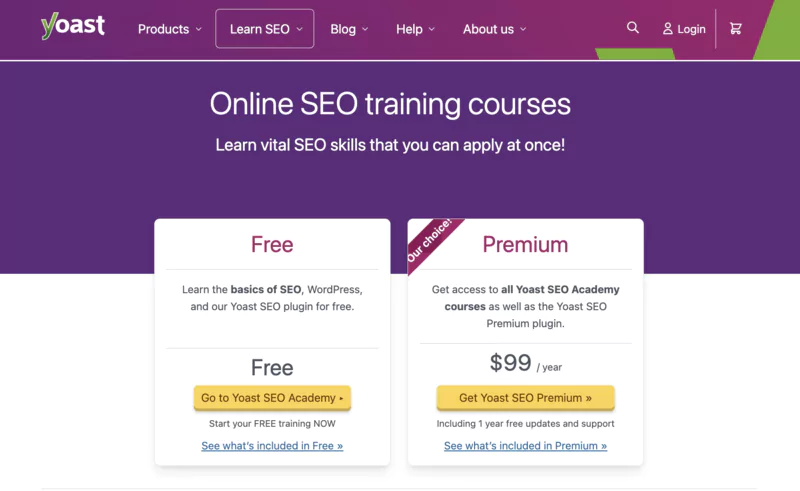Learn SEO

Today, where digital dominates everything else, the reasons to learn and understand SEO are several. It is a growing field that has an impact on the growth and success of almost every type of business. So it's no surprise that learning SEO can be a good thing for the success of your business or career:
However, some of the main reasons for doing so are as follows:
- For your brand to be discovered online
- To stand out from your competitors
- To save money that you should have spent on ads.
- Generate leads organically with minimal investment
In addition, SEO acts as a catalyst by increasing the commercial value of your visit by 429% with a Blog.
While the domain of digital marketing continues to intensify, the demand for SEOs is increasing. One of the main reasons for this is the growing need for businesses to achieve maximum reach and visibility organically.
After all, the organic search generates over 50% of all web traffic. This is evidenced by the fact that the demand for SEO professionals increased during the COVID-19 pandemic, when the job market hit a record low.
Now that you know the many benefits you can get from learning SEO, here's how you can get started.
SEO basics
SEO (Search Engine Optimization) is based on understanding how search engines work. There are three fundamental processes you need to know:
Exploring, Indexing, and Classifying
Search engines operate in three main steps:
- Exploration : Robots roam your website to discover the content.
- Indexing : The discovered content is stored in a database.
- The ranking : The pages are ordered in the search results.
The quality of these processes determines your visibility in search engines.
Keywords
The keywords are essentials for SEO. They represent the terms that your potential customers use to search for your products or services.
For a bakery in Adelaide, examples of relevant keywords would be:
- “Designer cakes in Paris”
- “Best bakery in Paris”
Integrating these keywords wisely into your content improves your chances of appearing in relevant search results.
Backlinks
Backlinks are inbound links to your site. They play a crucial role in SEO because:
- They signal to Google the credibility of your content
- They increase your organic search traffic
- They are among Google's top ranking factors.
An effective backlink strategy can significantly improve your online visibility.
Contents
Content is at the heart of SEO. Quality content:
- Improve your visibility in search engines
- Converts visitors into customers
- Provides the information needed for exploration and indexing
Over 50% of marketing professionals consider page content to be one of the most effective SEO tactics.
Google algorithms
Understanding Google's algorithms is crucial for SEO. Some important updates you should know:
- Google Panda (2011): Introduction of the “quality score” for websites
- Penguin (2012): Targeting unethical link building tactics
- Core Web Vitals: User Experience Assessment Based on Three Key Metrics
These updates influence how Google assesses and ranks websites.
Key ranking factors
Several elements are essential for a good ranking:
- Website security : Use of the HTTPS protocol
- Mobile usability : Adaptation to mobile devices
- Links : Importance of inbound, outbound, and internal links
- Contents : Quality and relevance of the content
- Site speed : Fast page load time
These factors, combined with the careful use of keywords and the optimization of Core Web Vitals, determine your position in the search results.
Keyword research and competition analysis
The implementation of an effective SEO strategy is based on two crucial activities: keyword research and competition analysis. These elements form the foundation of an optimized online presence.
Keyword research

Keyword research is essential for attracting targeted traffic to your website. It consists of identifying the terms and phrases that your target audience uses to search for products or services that are similar to yours.
A well-conducted keyword research process will allow you to:
- Discover the most popular search queries in your field
- Evaluate search volume for each keyword
- Understand the competition around these terms
For effective keyword research, consider using specialized tools such as:
- Google Keyword Planner
- SEMrush
- Ahrefs
- Ubersuggest
SEO tools will help you standardize the process, especially useful if you manage a large volume of content.
Competitive analysis

Competitive analysis goes hand in hand with the keyword research. It allows you to Understand the SEO strategies of your competitors and to identify improvement opportunities for your own site.
To start your competitive analysis:
- Identify your main competitors by doing a Google search for your target keywords.
- Use tools like Ahrefs Site Explorer to analyze the top-ranking pages.
- Look at keywords that are good for your competitors.
Competitive analysis involves auditing keywords, content, and other SEO elements used by your competitors. This approach allows you to reverse engineer their strategies and incorporate the most effective tactics into your own SEO strategy.
Use of Google search operators

Les Google search operators are powerful tools to refine your searches and get more accurate information. They can be particularly useful when analyzing the competition.
Some examples of useful search operators:
- site: to limit the search to a specific field
- Intitle: to find pages with keywords in the title
- Inurl: to identify pages with keywords in the URL
Skillful use of these operators can greatly improve the efficiency of your research and analysis.
Ongoing skills development

SEO is a field that is constantly evolving. To remain competitive, it is crucial to continue to learn and adapt. Here are a few ways you can do this:
- Follow recognized SEO experts on social networks
- Participate in webinars and conferences on SEO
- Experiment on your own projects or websites
Remember that mastering SEO takes time. Patience and regular practice are key to developing your skills.
Conclusion
After fighting a global pandemic, one thing is certain for businesses today: you can't afford to take your digital presence for granted.
That said, if you're just starting to see the benefits of your digital marketing and want to get started with SEO, it's never too late.
Start by learning the fundamentals of SEO, and continue to practice on a project to ensure that your skills are put to use. With the growing demand for SEOs around the world, learning SEO will only open the door to a lot of opportunities for you.
FAQS
Can I learn SEO on my own?
Yes, self-taught SEO learning is common, with resources in Online and courses available.
How do I get started with SEO?
Start with the basics of SEO and practice on real projects to develop your skills.
Is SEO hard to learn?
Although intimidating at first, the basics are quickly assimilated, but expertise requires practice and consistency.

.svg)







